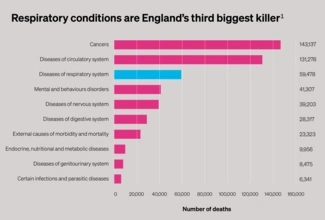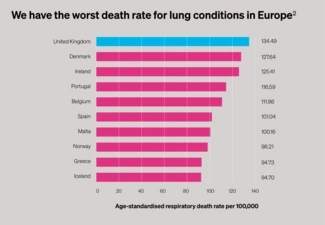
A mission for lung health
The government has identified three shifts that are required to reform the NHS. Getting respiratory care right will help achieve these, and patients will finally receive the care they deserve. Our new report sets out what the government needs to do to fix respiratory care.
The government has identified three essential shifts needed to save the NHS: from sickness to prevention; hospital to community care; and analogue to digital. Getting respiratory care right will help the government achieve these goals, and lung health patients will finally receive the care they deserve.
What we found:
Respiratory conditions are still England’s third biggest killer, and we have the worst death rate for lung conditions in Europe. There are huge disparities in outcomes for respiratory illnesses which are being driven by health inequalities.
For years the government has neglected respiratory care. This chronic under-prioritisation has led to lung conditions being the leading driver of winter NHS pressures, and the second leading contributor to NHS bed days.
This is why we are calling on the government not to leave lung health behind.

What we are calling for:
To reform the NHS from sickness to prevention, the government should:
- Tackle the toxic air pollution that kills 43,000 people every year, by establishing strong clean air targets in line with the World Health Organization to protect those most at risk.
- Prevent lung conditions by introducing a levy on tobacco companies to pay for a Smokefree Fund, ring-fenced for smoking cessation services, alongside the measures in the Tobacco and Vapes Bill to create a ‘smokefree generation’.
- Develop a cross-departmental national strategy to fix cold and mouldy homes that are killing people.
To move care from hospitals to communities, the government should:
- Keep patients well and out of hospital, particularly in the winter months, by delivering good year-round basic care in the community, including annual reviews, vaccinations, and pulmonary rehabilitation, to all those with lung conditions.
- Prioritise the diagnosis of respiratory patients by providing a spirometry recovery fund of £40 million over the next two years, with more funding to those ICSs experiencing higher levels of deprivation.
- Implement national minimum standards for ICSs as a fundamental part of the new 10-year NHS plan to ensure that all major respiratory conditions are diagnosed and treated effectively, with under-performing ICSs held to account.

To move from an analogue to digital system, the government should:
- Transform lung health research by committing funding and leadership to enable life-saving breakthroughs in how we diagnose and treat lung conditions.
- Improve data collection and analysis across the care pathway, and bring together primary and secondary data, to make high quality, publicly available data which will help ICSs target care where it is needed and ensure accountability.
- Support ICSs to deliver proactive care facilitated by the roll out of digital tools, to keep patients well within the community and out of hospital, especially over winter.
What you can do to support:
- The NHS and the government are working together to reform the NHS. They want to know what you think about the NHS, and what they need to change.
- This is your chance to share your views, experiences and ideas about how the NHS can better care for you and your lung condition.
- Read our blog post and to understand the questions in the consultation survey and see our suggested responses.
- Visit the NHS Change website to submit your views directly.
- Add your voice by signing our call on the government to make these changes as part of the NHS 10-year plan.
Appendix 1: Data sources
Life with a lung condition survey 2024
The Life with a lung condition 2024 survey was conducted between January and March 2024, gathering responses from 12,700 individuals across the UK. The survey was promoted through our mailing list, website, and both organic and paid social media channels. It covered a wide range of topics related to living with a lung condition.





